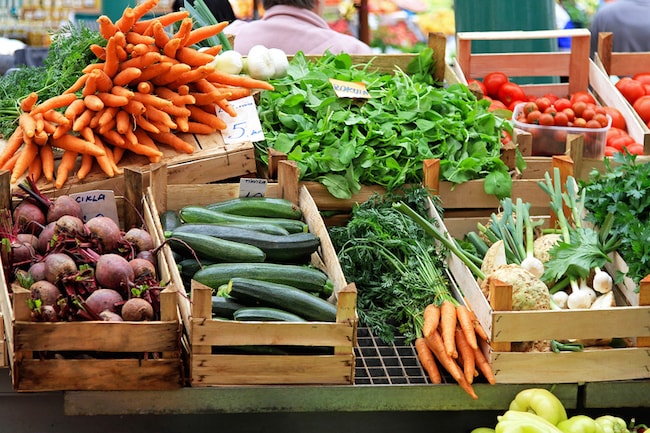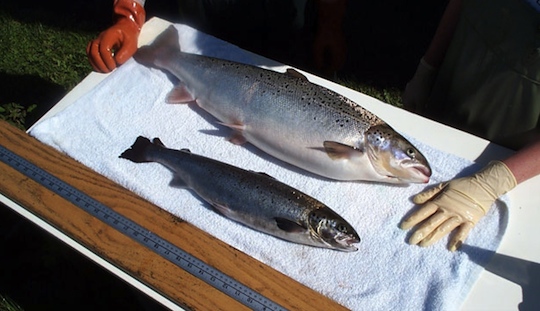
With a Voluntary Check-Off in the Works, What Should the Message Be for a National Advertising Campaign for Organic?
“Got Milk?”
“Pork. The Other White Meat”
“Beef. It’s What’s for Dinner”
You may not eat meat or drink milk, but you probably are familiar with one or all of these very famous slogans.
These advertising campaigns were all derived from a mandatory promotional program overseen by the USDA, also known as a check-off program, which charged companies in each industry a small yearly amount to fund its budget.
While there was widespread but not unanimous support for a mandatory check-off program in organic, the USDA terminated this idea in May, citing a lack of consensus among farmers.
Even though there may have been disagreement about the exact nature and specifics of a mandatory check-off, including how funds would have been disbursed, one thing cannot be disputed — given that organic is now a $50 billion market in the U.S., it makes absolutely no sense at all that there is no national advertising/branding campaign for our industry.
This especially rings true because of the relentless attacks in the media against organic — i.e., the recent Wall Street Journal op-ed piece The Organic Industry is Lying to You. Nevertheless, the fact remains that consumers are confused about what organic means.
This was confirmed in the 2018 U.S. Grocery Shopper Trends report from the Food Marketing Institute and the Hartman Group, where it was found that shoppers are seeking the following product claims:
Natural: 26%
Not Bioengineered (Non-GMO): 22%
Certified Organic: 14%
Not only are ‘Natural’ and ‘Not-Bioengineered’ inferior claims to ‘Organic’, but this confusion is resulting in lost sales for organic companies.
Seeking to rectify this issue and to strengthen the overall industry, the Organic Trade Association (OTA) has launched a voluntary “check-off like” program called GRO Organic (shorthand for Generate Results and Opportunity for Organic) and is soliciting input from all industry stakeholders.
While GRO Organic is intended to foster more organic agriculture in the U.S. and raise funds for research and consumer education, the bulk of the funding will be used for promotional activities, which means a branding/advertising campaign.
The critical question then becomes — what is the tone and message of this campaign? What will deliver maximum impact to consumers, so that they clearly understand the benefits of organic and change their shopping habits?
According to Stephanie Strom, former food business journalist at The New York Times, “The campaign should not be negative. The other side is much better funded, and they’ll come after organic food and farming more. It won’t pay off in a meaningful way. There is a place for a promotional campaign to explain to consumers what organic is and why it is better for the environment, animals and the soil.”
“Also, most consumers think organic is more expensive. If we can demonstrate that this is not necessarily the case or if it is more expensive and why it is worth the extra cost, that would be effective as well.”
Others believe that a different direction is needed.
Greg Fleishman, Co-Founder and CEO of Purely Righteous Brands, said, “Our world is over-connected and surrounded by ample amounts of noise pollution. For this campaign to breakthrough and truly educate people, it will require messaging that can cut through the clutter. Because of this dynamic, I believe that the focus should be on the super-toxic chemicals allowed in conventional food and farming, and the health risks they pose. Being bold and clear is the best way to get the right message out and internalized. This will have the greatest impact.”
However the campaign unfolds, it will impact every single one of us, and kudos to the OTA for deciding to seek input from all organic stakeholders, not just OTA members or GRO Organic backers.
“If the idea of broad and sustained private sector investment in the future of organic is to succeed, we need the best ideas in the hopper. It was an easy decision and one we are committed to,” said Laura Batcha, CEO/Executive Director of the Organic Trade Association.
To submit any idea you have related to growing, supporting and promoting the organic industry, you can do so HERE. GRO Organic will be accepting submissions until April 30, 2019, and this initiative has already raised $750K of its Year 1 goal of $1.5M.
When there is an update as to the status of GRO Organic and its activities — there could very well be a meeting about this at Natural Products Expo West 2019 in March — we will be sure to keep you informed.
 |
Have a great day! 
Max Goldberg, Founder |
Quick Hits
* Tonight in New York City, Food & Water Watch is holding its 2018 Benefit at Project Farmhouse and will be honoring writer, filmmaker and activist Jon Bowermaster for his contributions to the environmental community.
* Vermont organic farmer David Zuckerman, who played a critical role in his state’s GMO-labeling campaign and was a plaintiff/leader in the Organic Seed Growers & Trade Association et al. v. Monsanto lawsuit, was re-elected as lieutenant governor.
* The Organic Grower Summit, which aims to connect organic growers and producers with supply chain and service providers, will be held December 12-13 in Monterey, CA.
* In Brooklyn, Oddfellows Ice Cream Co. announced that it will soon be serving organic wine ice cream floats. Who knew?
* Score of the Week: REBBL landed Hollywood actress Ruby Rose — and her 13M Instagram followers — as an investor and advisor. Most importantly, this move is certain to help raise the profile of Not for Sale, REBBL’s non-profit partner that fights against human trafficking and exploitation around the world.
New Organic Products
Golden Turmeric Gut Shots by Farmhouse Culture
A new addition to the company’s gut shot line-up, Farmhouse Culture’s Golden Turmeric contains golden beets, turmeric, cumin, fenugreek, black pepper and cayenne, among other ingredients.
Pitted Kalamata Olives by Thrive Market
The question is — who doesn’t love Kalamata olives? Maybe that is why Thrive Market introduced its own line of organic Kalamata olives, which are harvested from the Laconia and Livanata regions of Greece. Each batch is pitted and brine-cured in water, sea salt, and red wine vinegar for extra flavor.
Backyard Bird Food by Wild Wings
Declines in wild bird populations worldwide are being linked to overuse of herbicides such as glyphosate. Fortunately, more backyard bird lovers are saying no to bird-killing pesticides with Wild Wings Organic Wild Bird Foods, the first premium certified organic outdoor bird food.
Want your product profiled here? Learn more
Weekly News Summaries


In California, Organic Farming on Public Land is Facing Opposition
By Laura Fraser
Some environmentalists are having a real issue with organic farming taking place on the grasslands of Point Reyes National Seashore, claiming they are despoiling a landscape visited by 2.5 million people every year.

How the Super-Toxic Dicamba is Pitting Neighbors Against Each Other
By Virginia Gewin
The super-toxic herbicide dicamba, which the EPA just re-approved for another two years, is not only destroying millions of nearby crops but is causing a serious divide among neighbors across the U.S.

Root Blends Launches CBD Smoothie Kits
By Beth Newhart
Seeking to tap into the growing 22-45 year old female demographic, New York-based organic smoothie company Root Blends has partnered with Function Botanicals to launch CBD smoothie kits.


The World's First GMO Fish is Stranded -- Fortunately
By Matthew Gonzales
Thanks to the important work of Alaskan senator Lisa Murkowski and environmental groups Center for Food Safety and Friends of the Earth, GMO-salmon is not yet available to U.S. consumers.
The Non-GMO, Non-Browning Apple
By Kate Bratskeir
Opals are the only non-browning apple grown in the U.S. and the only apple to be certified through the Non-GMO project.


Hotel in Kenya Takes a Bold Stand, Bans Non-Organic Food
By Mwangi Muiruri
MAJOR kudos to Lizzie Wanyoike, CEO of the Emory Hotel in Nairobi, for banning all non-organic food in her hotel. In her war against cancer-causing chemicals, the hotel has recruited a pediatric nephrologist and public health specialist to oversee the testing of all food that enters its kitchen. American hoteliers need to follow this woman's lead. Bravo!

Rael Raises $17.5M to Address the Organic Tampon Market
By Savannah Dowling
California-based Rael, which sources organic cotton for its products from Texas, has closed a $17.5M Series A led by Mirae Asset and GS Retail Fund.
The material in this newsletter is copyrighted and may be reprinted by permission only. All requests must be in writing. Please use our contact form to request republication rights.
Newsletter Archive
Quick Hits
* Tonight in New York City, Food & Water Watch is holding its 2018 Benefit at Project Farmhouse and will be honoring writer, filmmaker and activist Jon Bowermaster for his contributions to the environmental community.
* Vermont organic farmer David Zuckerman, who played a critical role in his state’s GMO-labeling campaign and was a plaintiff/leader in the Organic Seed Growers & Trade Association et al. v. Monsanto lawsuit, was re-elected as lieutenant governor.
* The Organic Grower Summit, which aims to connect organic growers and producers with supply chain and service providers, will be held December 12-13 in Monterey, CA.
* In Brooklyn, Oddfellows Ice Cream Co. announced that it will soon be serving organic wine ice cream floats. Who knew?
* Score of the Week: REBBL landed Hollywood actress Ruby Rose — and her 13M Instagram followers — as an investor and advisor. Most importantly, this move is certain to help raise the profile of Not for Sale, REBBL’s non-profit partner that fights against human trafficking and exploitation around the world.



